Youth Advocacy in Action (Spring 2023)
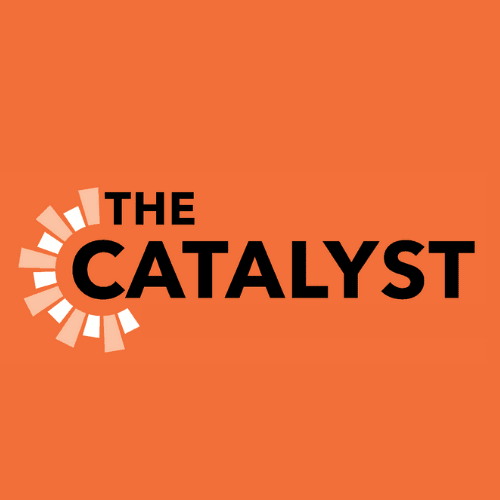
Advancing PAI’s Mission Through Primary Health Care
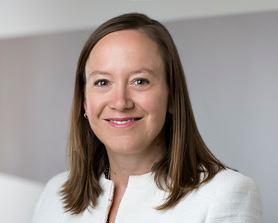 As health advocates, it’s easy to get stuck in our silos—whether we are addressing safe childbirth, vaccines or family planning. But to an individual or family, all our separate issues are just one issue: to them, it’s simply about their overall well-being.
As health advocates, it’s easy to get stuck in our silos—whether we are addressing safe childbirth, vaccines or family planning. But to an individual or family, all our separate issues are just one issue: to them, it’s simply about their overall well-being.
And their well-being is best served by a primary health care system that can meet all of their basic health care needs. A system where a woman can go to get her children immunized, pick up some anti-diarrheal medication for the family and fill her prescription for birth control pills at the same clinic. If as a movement we don’t understand this need, we run the risk of not doing all we can to advance our cause with partners at the national level.
That is why I believe that to advance the global movement for health, it’s imperative that PAI sit at a range of tables, not only those related to sexual and reproductive health.
Our work in PHC exemplifies our pragmatism; we know we can accelerate PAI’s mission far more through collaboration than on our own. We can reach more women and girls by also engaging with a larger system as we partner with smaller groups in countries. Our PHC initiative also epitomizes our constant willingness to step into new spaces that help us think about the relevance of the issue we’re fighting for.
That approach is who we are. Always agile, always ready to see how issues, such as vaccine delivery and maternal care, overlap with women’s sexual and reproductive health and rights. And always focused on how—and where—we can advocate for the rights and well-being that all women and girls deserve.
Sincerely,

Suzanne Ehlers
President and CEO
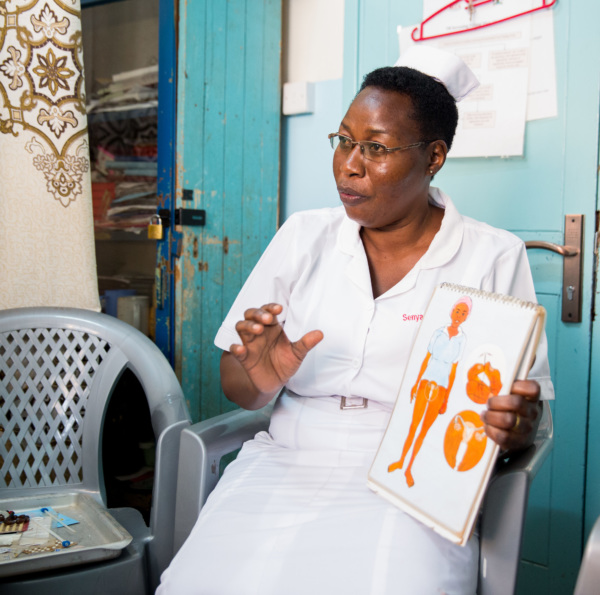 PAI Leads Effort to Bolster Primary Health Care Systems Through PHC Initiative
PAI Leads Effort to Bolster Primary Health Care Systems Through PHC Initiative
Primary health care undergirds every health care system. It is the day-to-day care provided when you are sick or in need of routine check-ups, prenatal care, vaccinations and more. When a country’s primary health care (PHC) system functions well, people can get the care they need, and they have reliable access to medicine to stay healthy.
However, at least half the world’s population still lacks access to the essential health services provided at this basic level of care. In fact, comprehensive PHC is often the weakest link in a country’s health system. It’s underfunded. It’s understaffed. It’s not a priority.
Ensuring that PHC systems understand and are equipped to respond to women’s and girls’ health needs over the course of their lives is critical. A strong system that provides a full range of essential services, including family planning and reproductive health care, can serve as a pathway to achieving a future where women and girls around the world have full access to high-quality, comprehensive sexual and reproductive health care.
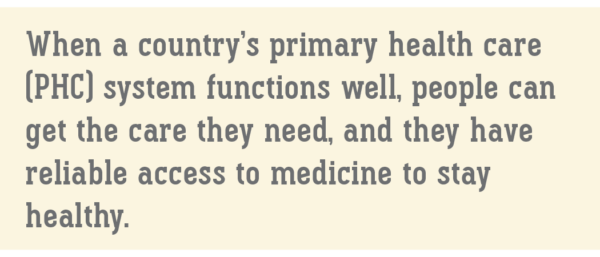 PAI is leading an effort to bolster PHC systems through our Primary Health Care Initiative. Since 2015, we’ve collaborated with partners working at the global and country levels to foster an enabling environment for high-quality primary health care. That means ensuring country leaders provide sufficient budget resources and implement supportive policies that expand access to essential health care—including reproductive health services—through strong PHC systems. We also convene the Primary Health Care Strategy Group, a coalition of civil society health advocates from around the world. With them, we’re working toward improving global and domestic funding and policy, so that countries can build strong PHC systems.
PAI is leading an effort to bolster PHC systems through our Primary Health Care Initiative. Since 2015, we’ve collaborated with partners working at the global and country levels to foster an enabling environment for high-quality primary health care. That means ensuring country leaders provide sufficient budget resources and implement supportive policies that expand access to essential health care—including reproductive health services—through strong PHC systems. We also convene the Primary Health Care Strategy Group, a coalition of civil society health advocates from around the world. With them, we’re working toward improving global and domestic funding and policy, so that countries can build strong PHC systems.
PAI is committed to advocacy on all fronts, large and small, to expand women’s access to quality, equitable sexual and reproductive health care. Learn more below about how one of our partners in Ghana is working toward that goal by advocating for better primary health care.
Overcoming Barriers to Create a Healthy Future for All

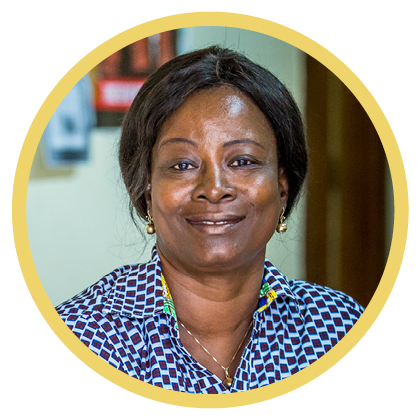 Although the health system in Ghana is often regarded as one of the most successful in Africa, it is not without its challenges. But many of those challenges are being tackled head on through the dedicated engagement of PAI partner, Alliance for Reproductive Health Rights (ARHR).
Although the health system in Ghana is often regarded as one of the most successful in Africa, it is not without its challenges. But many of those challenges are being tackled head on through the dedicated engagement of PAI partner, Alliance for Reproductive Health Rights (ARHR).
ARHR works to educate communities, policymakers and providers in Ghana about primary health care and family planning; foster conversations and connections among them; and encourage shared responsibilities. These are among the key strategies in ARHR’s efforts to establish adequately funded, high-quality health care systems that offer a complete range of services, including attention to women’s sexual and reproductive health.
“We help to hold the government accountable to its promises, and we’re working to build a critical mass [for people to] understand their rights,” says Vicky Okine, executive director of ARHR. “We also have a responsibility to demand those rights and amplify through public visibility campaigns.”
For instance, ARHR recently analyzed the health component of Ghana’s 2018 budget and identified challenges likely to impede the government’s efforts to achieve universal health care, which relies on strong primary health care systems. Among the challenges ARHR pointed out is that the government excluded the health sector in its medium-term budget priorities—even though leaders acknowledged under-investments in health ultimately harm citizens’ well-being. ARHR’s analysis also found that the government’s budget failed to provide a clear plan for how to equitably distribute health workers across the country to provide care.
ARHR shared its findings from the budget analysis with members of its PHC advocacy coalition, which then agreed to meet with national health officials to discuss the findings and decide on a way forward— particularly, how to influence the 2019 budget for the health sector. ARHR’s engagement demonstrates how PAI’s partners convene other civil society organizations to foster dialogue and create solutions that advance equitable, quality health care for all.
“ARHR is one of the few NGOs talking about universal health coverage in Ghana, especially combining financing and primary health care,” Okine said. “This is an opportune time to work closely with civil society colleagues, Ghana Health Service and parliamentarians.”
Dr. Joseph and Lisa Rossi Are Passionate About Ensuring That Women and Girls Have Access to Reproductive Health Care Services

Dr. Joseph Rossi was on his obstetrics and gynecology rotation in medical school when he met a young woman. She was perhaps 22 years old and was about to welcome her sixth child into the world.
Her circumstances—young, single, so many children—made an impression on Joe. “Her life went one way, when it could have gone another,” he said. Because of this patient, Joe began to view women’s reproductive health, particularly the availability of information and services, in a new light. He considers this experience with the young woman as “one of the seminal events” affecting his views not only on women’s care, but their empowerment.
Today, Joe, a pediatric anesthesiologist, and his wife Lisa, a nurse, are doing their part to ensure that women and girls the world over have access to the reproductive health care services they need through their longtime support of PAI. The couple, who live and practice in New Mexico, have donated annually to PAI for over 20 years.
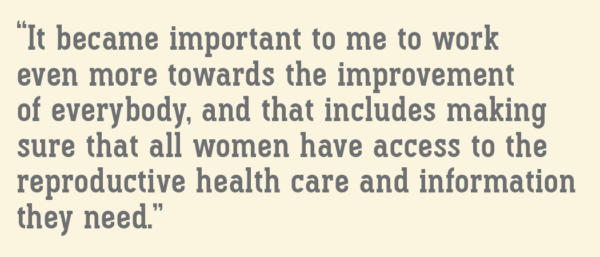
In 1997, the Rossis decided to commit to supporting several organizations annually. Each chose two nonprofits that aligned with their interests, which included tackling hunger and protecting the environment. “I was looking for a smaller organization that was a good steward of donors’ money and was concerned about health and women’s health,” Joe said, adding that he believes he learned of PAI through Charity Navigator.
It has turned out to be a good fit. “Supporting PAI allows us to get beyond the borders of America where we’ve been very blessed,” he said. “And as best we can, to help try to level the playing field” for all members of society. In the years since the couple started giving to PAI, they’ve become more aware of disparities in the quality and availability of health care in the U.S. and worldwide. This awareness—and the memory of that young mother so long ago—propelled Joe in 2015 to pursue a master’s degree in health care ethics.
“It became important to me to work even more towards the improvement of everybody, and that includes making sure that all women have access to the reproductive health care and information they need,” he said.
We are fighting back against the onslaught of harmful policies that discard reproductive rights.
Stay informed about the issues impacting sexual and reproductive health and rights.
